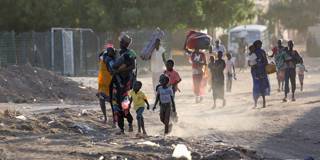After a relative lull following the end of the Cold War, violent conflicts have proliferated around the world since the turn of the century, and they generally proven to be more protracted than in the past. Among the biggest factors behind this disturbing trend is the rise of interventionist "middle powers."
BRUSSELS – On April 15, a standoff between the Sudanese armed forces and a rival paramilitary outfit erupted into what now looks like all-out civil war. As we write, in mid-May, fighting is tearing apart the capital, Khartoum, and millions are caught in the crossfire, trapped in their homes, and struggling to secure food, drinking water, and other essentials. Those who can are leaving the country. Neither the army nor its paramilitary foe looks likely to prevail – at least not without a protracted struggle and tremendous death and destruction.
The fighting is rooted in Sudan’s struggles to shake off decades of authoritarian rule. While an inspiring countrywide protest movement prompted the ouster of then-President Omar al-Bashir in 2019, his political legacy, particularly his brutal wars on Sudan’s periphery, haunted the revolution from the start.
One protagonist of today’s conflict is Mohamed “Hemedti” Hamdan Dagalo, a warlord from Darfur who was part of Bashir’s genocidal campaign against rebels in that region. Bashir then refashioned Hemedti’s paramilitaries as the Rapid Support Forces (RSF) and empowered them as a hedge against an army takeover. The other belligerent, General Abdel Fattah al-Burhan, is a military man deeply suspicious of civilian rule who was also implicated in the Darfur wars.

BRUSSELS – On April 15, a standoff between the Sudanese armed forces and a rival paramilitary outfit erupted into what now looks like all-out civil war. As we write, in mid-May, fighting is tearing apart the capital, Khartoum, and millions are caught in the crossfire, trapped in their homes, and struggling to secure food, drinking water, and other essentials. Those who can are leaving the country. Neither the army nor its paramilitary foe looks likely to prevail – at least not without a protracted struggle and tremendous death and destruction.
The fighting is rooted in Sudan’s struggles to shake off decades of authoritarian rule. While an inspiring countrywide protest movement prompted the ouster of then-President Omar al-Bashir in 2019, his political legacy, particularly his brutal wars on Sudan’s periphery, haunted the revolution from the start.
One protagonist of today’s conflict is Mohamed “Hemedti” Hamdan Dagalo, a warlord from Darfur who was part of Bashir’s genocidal campaign against rebels in that region. Bashir then refashioned Hemedti’s paramilitaries as the Rapid Support Forces (RSF) and empowered them as a hedge against an army takeover. The other belligerent, General Abdel Fattah al-Burhan, is a military man deeply suspicious of civilian rule who was also implicated in the Darfur wars.